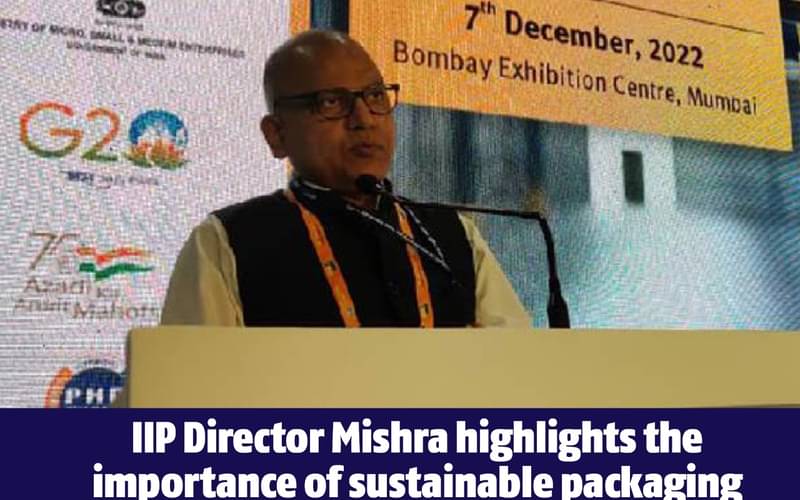IIP Director Mishra highlights the importance of sustainable packaging
RK Mishra, the director of Indian Institute of Packaging, outlined his vision of India's premier packaging centre and provided an industry perspective about packaging in the post-pandemic era. Mishra was speaking at the International Conference on Packaging organised by PHD Chamber of Commerce and Industry during the PackMach Expo.
09 Dec 2022 | By Abhay Avadhani
RK Mishra said "Globally, the packaging industry sector has positioned itself as one of the fastest-growing industries across all countries.And the Indian packaging industry is becoming a preferred hub for the global packaging industry. Today it is the fifth largest sector in India’s economy."
Mishra said, "With the emergence of e-Commerce business, digital marketing, and circular economy are all combined together to boost the scope for research and development in the area of environmentally friendly and sustainable packaging. He pointed out how, "The industry is gearing itself to adopt scientific and functional packaging."
The government of India has been taking several measures to ensure awareness towards the elimination of single-use plastics. He highlighted how India is working on various initiatives about sustainability and "is committed to building a circular system which can overcome waste management challenges."
He said, "To encourage innovation in the development of alternatives to identified single-use plastic items plus digital solutions to packaging waste management, there is the Startup India Initiative."
According to a recent study by Fortune Business Insights, the food packaging market globally is expected to grow from USD 338.34 billion in 2021 to USD 478.18 billion by 2028. Mishra said this translated into a growth rate of 5.1% CAGR due to the demand for high-quality food products.
Mishra pointed out that "As the food industry was under essential services by all the governments, the impact of Covid-19 on the global market was much lower than other manufacturing industries." He pointed out "Flexible packaging companies which are serving the sectors such as packaged foods have been performing in the post-pandemic world." He added, "We are noticing in the last few years that flexible packaging is replacing traditional packaging, such as glass jars and metal cans. This is due to the multiple benefits such as extended shelf life, cost-effectiveness, lightweight, and lower cost of transportation. This is reducing the cost of production as well."
In addition to the significant growth of flexible packaging across food, beverage, cosmetics and personal care products, household, and pharmaceutical products, Mishra highlighted how the Indian consumer has become more health-conscious and is seeking hygiene, and safety features.
The other trend Mishra alluded to was how packaging converters are developing new, innovative mono-polymer, fully recyclable, flexible packaging laminates. He said, "In the case of sustainability, we will see the continued transition from plastic to paper flexible packaging." He said, "Plastic provides significant benefits of barrier functionality delivering resistance to gases, moisture, light, and aroma where needed. But, for certain packaging such as confectionery packs, it is clear that paper is more suitable and brands also find it more appropriate in terms of environmental concerns."
Next he highlighted how "Packaging companies deploy various types of pigments, inks, and packaging materials to make food packaging more attractive. But it is found that some substances are toxic and present health risks ranging from a simple mild hypersensitivity reaction to an anaphylactic process or even a lethal reaction."
Mishra spoke about how "The Bureau of Indian Standards (BIS) has recently issued a revised standard for printing ink for food packaging; recommends the exclusion of several pigments, dyes, solvents, plasticizers, and other compounds from printing ink formulations." This standard, he said, was formulated with a view to assisting the manufacturers of printing inks to produce inks, which are intended for use on food packages and which do not contain any hazardous chemicals that may get transferred to the food inside the packet, and help food packers and manufacturers of packages in selecting proper quality printing ink.
Also, he shared details of how the Union Ministry of Environment, Forest and Climate Change (MoEFCC) has issued a notification for EPR policy guidelines for the management of plastic waste in India. Mishra said, "Extended Producer Responsibility (EPR) is a policy guideline that every PIBO i.e. producers, brand owners, and importers must follow while consuming plastic packaging material in order to introduce their products in the market as mandated in the Plastic Waste Management (PWM) rules."
Today, the EPR guidelines provide a framework to strengthen the circular economy of plastic packaging waste and promote the development of new alternatives to plastics. Mishra said, "The EPR objective is to reduce the use of fresh plastic material for packaging."
He concluded his address by sharing an update about IIP in conduct training, testing, and consultancy in the field of packaging. He mentioned the opening of a new centre in Bengaluru. He "welcomed all the stakeholders and industry members to join hands with IIP in the interest of the industry and for a better, more sustainable and eco-friendly packaging."


